 Home Page
Home Page
Epic of Gilgamesh
|
Gilgamesh is a surprisingly modern text for a 4000-5000 year
old story.
World of the ancient Near East described by Henri
Frankfort. Before Philosophy. 1949.
The good life is the obedient life
Man is the slave of the gods
The world privileges obedience to
- gods
- state
- occupation
- family
It's an ordered world, assuming there is some authority in charge.
As in the state, the highest authroities are remote and can only be approached in time of great need and then only through intermediaries.
The individual only has close relations to his personal
god--one that's taken an interest in his family.
One's personal god takes an interest in his protection and
success.
In trouble, you appeal to your patron, who finds you a
protector among the greater gods. You hope to get help
as a favor
from your god.
3 millennia bc, with growth of the state, the system of
justice began to work more efficiently. Punishment
follows crime more often.
Before the state, there was only revenge--blood feud.
Now people began to see justice as a right rather
than as a favor, even in religion.
But if justice is a right, that leads to the question of why
the good suffer, then to question of if there's justice at
all. (Bob--because humans are such good individuals).
Leads to revolt against the gods, and against death itself.
Gilgamesh discussion
The text is a mess
The study of near eastern languages is very recent
- The Hittite text was discovered in the early 20th century, but nobody could read it until the mid-20th century
- Minoan A was not decifered until then either.
- Etruscan still hasn't been decifered.
Europeans began getting b its and pieces of Gilgames in
the 19th century, starting with Europeans in the mid-East in the
late 1700s.
18th Century. William Jones went to India from
England. Knew Greek and Latin, and he started seeing
similarities between Greek, Latin, and Sanskrit.
Romantic Movement spawned a scholarly revolution in
Germany. They revolted against the French, stressed all
things German.
While the Grimms collected folk tales, other scholars delved
farther back.
Studied Germanic languages.
- Modern German
- Middle High German (medieval)
- Old High German (ancient)
They began to notice similarites between German and other languages.
| English |
father |
| German
|
vater |
| Latin |
pater |
| Greek |
πατήρ |
This led them back to an ancient language--they called it Indo-Germanic because of their stress on all things German
Aryans produced Sanskrit -- Germans took to calling themselves
Aryans as the master race. Very popular among the
Nazis. NOW only refers to early inhabitants of India.
Anyway, scholars generally now call the early language Indo-European, although its offshoots to east into Asia, especially India.
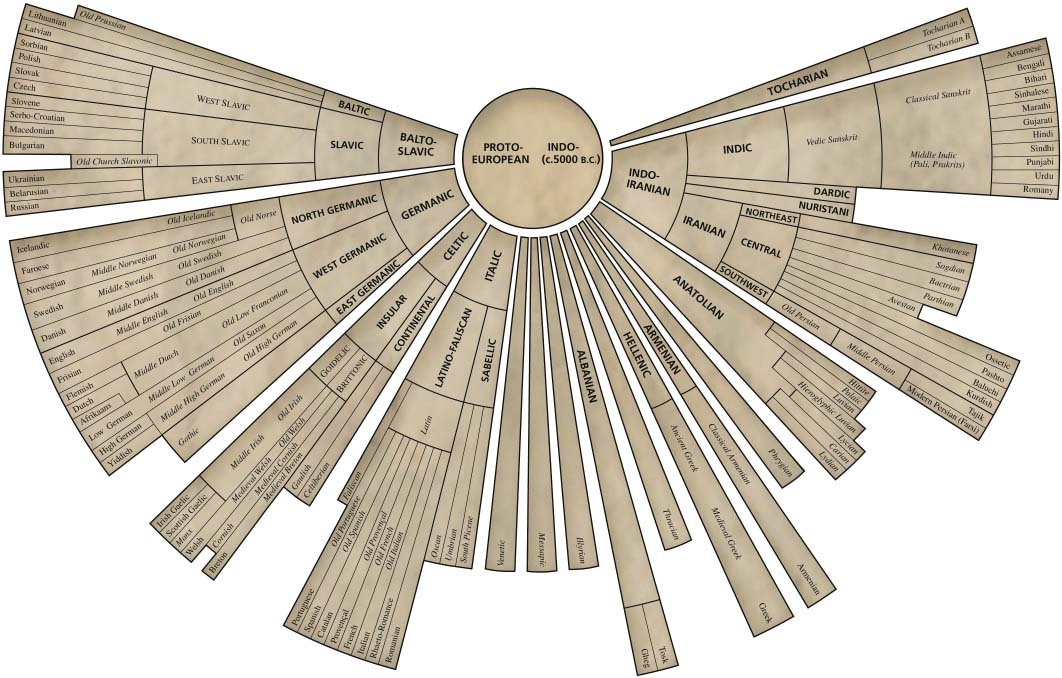
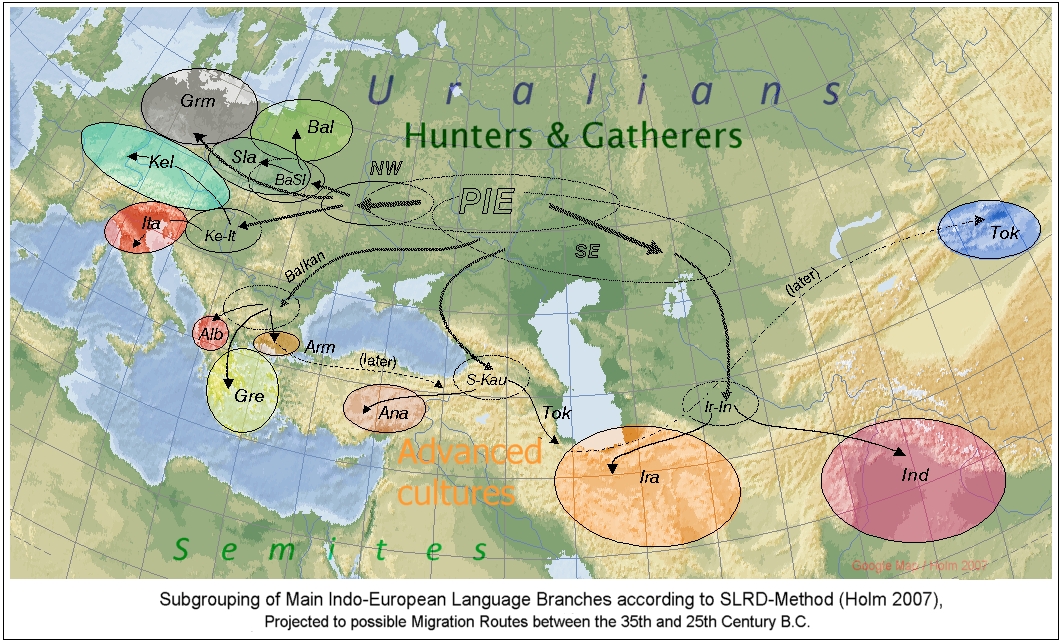
During this time, Historical Linguistics and Comparative Linguistics developed
This was an important element in European Romanticism.
The 1st modern edition of Beowulf came out then - in Germany. Beowulf is the first major work in the literatures of English, German, and Danish liteature.
The Slavs started a pan-Slavic movement - those languages trace back to Indo-Europpean also.

The Greeks adapted the Phonecian alphabet to Greek after 800 BC. Phonecian & Hebrew don't have vowel signs. The Greeks added vowel signs to their alphabet by using extra consonants from the Phonecian alphabet.
Hebrew is also very old. It had a different
alphabet. Doesn't fit Indo-European very well.
As explorations continued, they kept finding Cuniform tablets,
but they couldn't read them either.
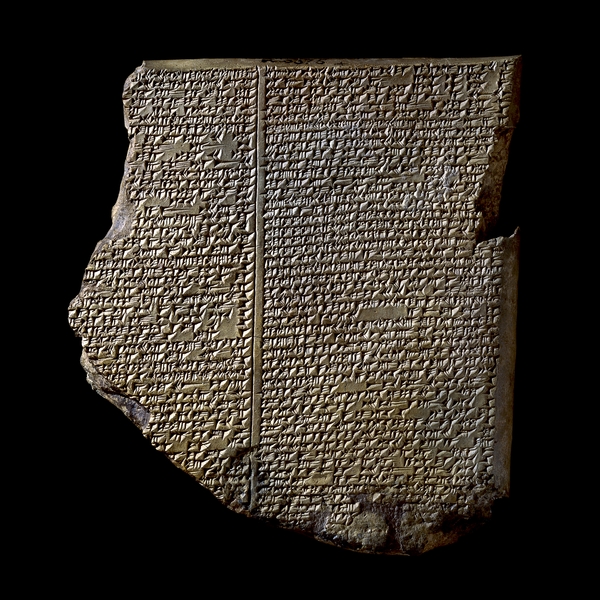
Cuniform is written by making impressions in clay with a stylus. For permanent writing, bake the clay.
These clay tablets got dispersed as they were discovered. Archaelogy was a gentleman-scholar's hobby. As the scholars unearthed the tablets, they had them shipped back home, wherever that was. Tablets from nearby villages wound up in different countries. Made studying them difficult
Late in the 20th Century, efforts started being made to copy and distribute these tablets to various scholars.

Syria. Library at Ashurbanipal.
The primary edition of Gilgamesh was
found here. It is used as the foundation text. Other
fragments are collated against this one.
Thorkill Jacobsen traces the history of the text.
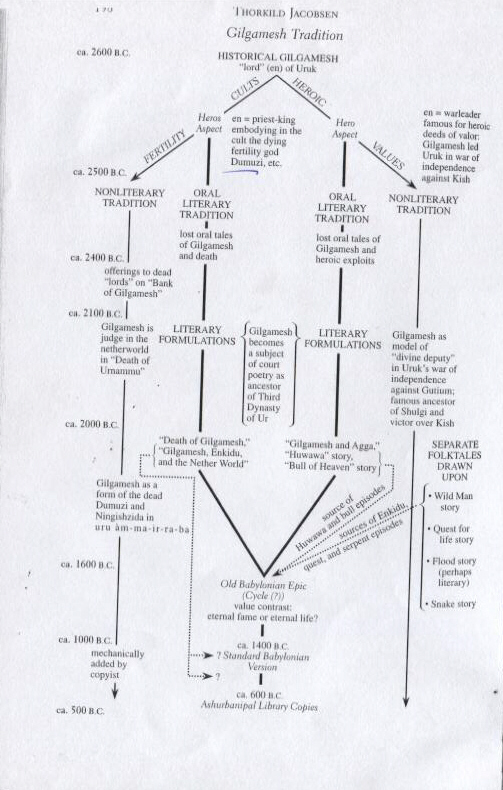
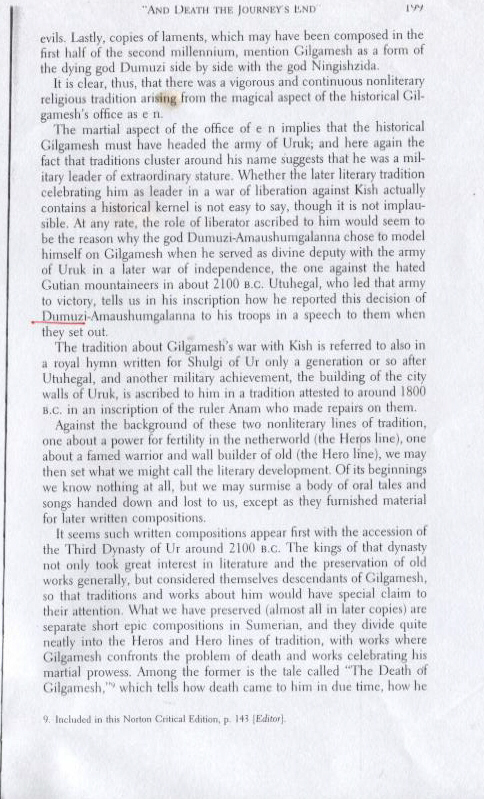
Normally writing down a text slows or stops the oral tradition.
Not so with Gilgamesh--the oral versions continue to develop along with the written.
Gilgamesh in the early king lists--a priest king in the fertility cult of Dumuzi. He was associated with the death and rebirth as a warlord, make Uruk independent from Kish.
1000 BC Various written and oral forms
600 BC Ashurbanipal copy made.
So we end up with various oral and written versions.

Greeks in the 5th Cen BC thought the Iliad & Odyssey were written - were actually oral.
Roman's great epic poet was Virgil - it was a literary epic.
Epics from then on were thought of as literary until the 20th
century
Milman Perry - Went to Jugoslavia. He discovered living
oral epic poetry.
Oral poetry is fluid. Changes every time you sing it.
For instance, the names change over time. In Homer, Iphanessa is Agamemnon's sacrificed daughter. She's called Iphigenia in later works.
Heroes are gods & goddesses, or god-like humans with divine
parents usually.
Heroes reperesent the highest values of a particular people.
We have Gilgamesh stories that don't fit the epic we
have. Just as neither the Iliad nor the Odyssey tell of Achilles' death by an arrow,
nor do they have the Trojan horse.
Homer is the master text for the stories of Achilles and
Odysseus. Greeks listened to these stories being chanted.
6th Cen BC, the tryant Pisistratus had the standard text
fixed. He was somewhat like the King James of the Iliad and the Odyssey. Didn't work
on the text himself, but had scholars do it. He also
started the Pan-Athenaic Festival. He invited
Greeks from all over to come to Athens to celebrate Athena and
spend money. The Homeric poems were chanted by the rapsodes,
who chanted the whole texts as it had been fixed by the
scholars. No longer a living oral epic.
Cycle of Epics fill in the gaps - written later (6th-5th cen
BC). Cycles pick up with Odysseus' other adventures
- one has him run off with Helen - (the more natural paring -
Jungman).
Episode 1 Gilgamesh meets Enkidu
Early writing used primarily for records. Receipts
Writing for literature comes later. Don't need it in
writing -- heard it in song. Mostly men writers, but some
women. Sappho greatest lyric poet in Greece
Gilgamesh has a lot of parallels with Genesis
- Both have a paradise for humans
- Both have a flood. Gilgamesh visits Utnapishtim. How he survived the flood. Sent out birds like Noah.
- Serpent is a problem animal. Is man's enemy.
- Tree of life.
- Descriptions of the underworld in Gilgamesh correspond to Jewish Sheol. Dark gloomy place where shadows of people flit around.
- Strong man betrayed by a woman (Enkidu & Shamat, Ishtar & Gilgamesh, Samson & Delilah).
Jewish texts go back to earlier Middle Eastern texts.
Abraham traditionally from Sumer.
Friendship with Enkidu is the heart of the epic.
Enkidu dying curses the woman until Gilgamesh points out his
benefits from civilization.
Ishtar is the Great Mother. She offers herself to
Gilgamesh. All her former lovers came to a bad end.
Turns them into animals (like Crice).
Gilgamesh says no, she sends Bull of Heaven against them.
After killing it, Enkidu hits her with part of the bull.
Very disrespectful.
Gilgamesh generally negative toward women.
Gilgamesh & Enkidu primarily relate to each other.
Women secondary.
Gilgamesh lustily practicing the jus primae noctis.
Having the woman on the first night makes the marriage
blessed. Is running amok among the women.
Gods create Enkidu to be a match for him. They fight
& become companions. Male bonding replaces sex with
women.
Episode 2 Fight with Humbaba
Gilgamesh wants to make a name for himself for posterity.
Like Homeric heroes.
Could be an expedition by a human king to get wood.
Mythologized to be a fight with the forest demon.
Episode 3 Ishtar
Episode 4 Bull of Heaven
Episode 5 Enkidu dies
Episode 6 Search for Eternal Life
Gilgamesh mourns his friend's loss, but also is mourning his
own impending death
Undertakes another journey. LIFE IS A JOURNEY TOWARD
DEATH.
Goes to Utnaphistim. Wants to conquer death. Stay
awake for a week is the test. Sleeps for a week
instead--bread is the proof.
Gets the plant of Eternal Life, which the snakes steals.
IMPORTANT QUESTIONS
- Search to escape death
- Search for knowledge
- Search for justice--why must man die? Because
he's mortal seems to be the suggestion of the poem.
Why doesn't he eat the plant? Jungman thinks he's being
unselfish--wants to be a hero & bring back a boon to his
people. I think he's a paranoid despot who wants to see
what happens when somebody else eats it before he takes a chance
on it. What do you think?
Barmaid tells him he won't succeed--go home, eat, drink, enjoy
life (like Ecclesiates).
Gilgamesh continued
Questions of Gilgamesh
Were Gilgamesh & Enkidu lovers? No good answer. People now read it back into text. Hard to know what is actually there.
When you see 2 men kiss in Russia, means something else
We're reading translations, making it hard to know what the original text meant.
Homosexuality a big question in scholarship.
Also an issue in Homer. Achilles & Patroclus sleep in same tent, with women--not men.
Later Greek culture, there is explicit homosexuality.
Was Enkidu the double of Gilgamesh? Possibly--his wild side.
Gilgamesh meets Utnapishtim
Asks how to get eternal life.
Utnaphistim says nothing lasts forever.
Gilgamesh does not get eternal life.
Is his quest a failure?
Perhaps. It's the question.
He brings back the knowlege of death.
What can you do with your life?
- Eat drink & be merry
- Do something so great that the singers will remember you (Kleos (κλέος ? glory, fame) is the concept of glory earned in heroic battle)
- Build the walls of your city. Establish something
that will live after you & the inhabitants will have
better lives as a result.
19th century culture moves from realism to naturalism.
Naturalism--human beings are at the mercy of large-scale forces that are indifferent to us. Crane's "The Open Boat."
War, nature, economics are beyond us.
Where is God in the naturalist's world? Either doesn't exist or doesn't care.
Move into the horrible naturalistic world of WWI.
After that, have the Roaring Twenties. Want to
party b/c no other values hold up.
Nihilism--there
are
no
values
we can hold onto. Move into a world w/o values. T.
S. Eliot's Wasteland
Is that the correct response?
Major philosopher of 19th Cen - Nietzsche - man's major
challenge is to make a place in a nihilistic world
Create meaning in your life through choices you make.
Existentialism
is that approach. In a meaningless world,
life can have meaning for us.
Nietzsche, Heidigger, Camus, Sartre, Camus -- the only
true philosophical question is whether to commit suicide.
We still have a responsibility to make a
commitment. Choose something that will give my own
life meaning.
Ethical question is regarding the choices we make
Can become a good Nazi, a good Communist, etc. How
to choose among the choice.
Heidigger says existence is Dasein - being
there
Being and Time I'm aware
I'll die. But also aware I'm alive in a specific
time and place with others like me.
I am alive, not as isolated individual, but with other
Dasein. Should prevent me from becoming a Nazi.
What does Gilgamesh bring back to his people?
Like existentialism--bring back an awareness of death
PLUS the need to build for others.
Doesn't really end with a low search for pleasure.
Another reading of the end of Gilgamesh.
Joseph Campbell The Hero with a Thousand Faces. Relied on Carl Jung for his work.
Freud believes in Ego, Superego, Id

Id has the forces of Eros & Thanatos
Eros - food and
sex
Thanatos - Aggression to go get the necessities of eros.
Superego regulates these instincts. Id emerges in sleep and when drunk or drugged.
Healthy person regulates his id will
Jung adds the Collective Unconscious
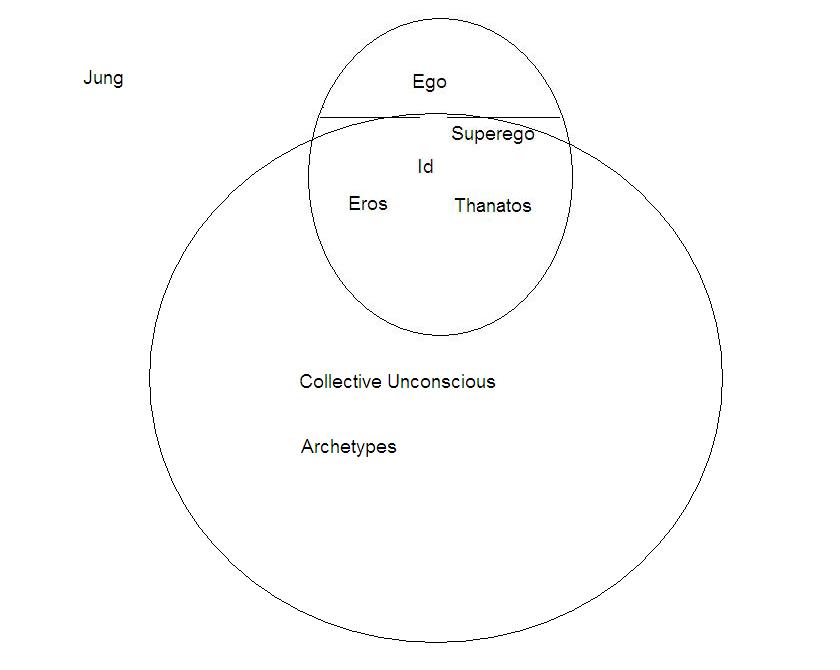
These come out in archetypes.
Men have anima in their unconscious--his ancestors' experience of women. Infliuences his choice of women.
His feminine element
Women have animus.Their masculine side. Female ancestors' experience of women.
Healthy person integrates the collective unconscious.
How we deal with the Indivuation Process.
Integrating the collective unconscious into the conscious mind is the task of being human.
Jung examines dreams, fairy tales, stories from around the world - narratives.
Major works often share a pattern showing the person going through the individuation process
Campbell calls this person the Hero.
Separation - Initiation - Return
Under the surface of all these stories is the common hero going on a quest, overcoming obstacles, frequently with a helper, & returning with a gift for his people
According to Joseph Campbell in The Hero with a Thousand Faces, heroes in myth and fiction typically go through a three-stage process in their growth toward maturity -- separation, initiation, return. He describes the process this way:
A hero ventures forth from the world of common day into a region of supernatural wonder: fabulous forces are there encountered and a decisive victory is won: the hero comes back from this mysterious adventure with the power to bestow boons on his fellow man. (Campbell 30)
The plot of Huck Finn is rather loose at times; nevertheless, it is unified by this theme of separation initiation and return.

The people who have not gone throught the individuation process may not be able to accept the gift. It doen't make sense.
Gawain wears the green sash as a sign of shame.
The others wear it b/c Gawain is wearing it. Like going out & buying a black belt. See the outward sign of Gawain, don't know the experience.
Gilgamesh poem tries to reveal to us what he's learned
It's a pessimistic view--most won't understand or accept the individuation process.
